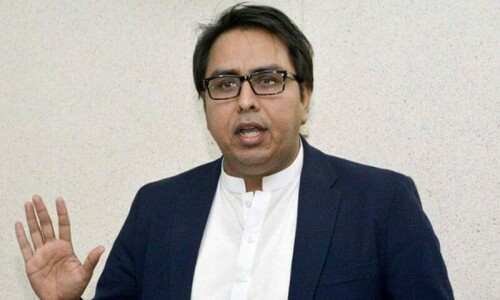
JUBA: Over 3,000 people were killed in South Sudan in brutal massacres last week in an explosion of ethnic violence that forced tens of thousands to flee, the top local official said Friday.
“There have been mass killings, a massacre,” said Joshua Konyi, commissioner for Pibor county in Jonglei state.
“We have been out counting the bodies, and we calculate so far that 2,182 women and children were killed and 959 men died.”
United Nations and South Sudanese army officials have yet to confirm the death tolls and the claims from the remote region could not be independently verified.
If confirmed, the killings of 3,141 people would be the worst outbreak of ethnic violence ever seen in the fledgling nation, which split from Sudan in July.
A column of some 6,000 rampaging armed youths from the Lou Nuer tribe last week marched on the remote town of Pibor, home to the rival Murle people, whom they blame for abductions and cattle raiding and have vowed to exterminate.
The Lou Nuer gunmen attacked Pibor at the weekend, torching huts and looting a hospital, and only withdrew after government troops opened fire.
Over a thousand children are missing, feared abducted, while tens of thousands of cows were stolen, added Konyi, who is himself an ethnic Murle.
The UN humanitarian coordinator for South Sudan, Lise Grande, said she feared “tens, perhaps hundreds” could have died.
“Yes, there have been casualties, but we don't have the details, and can't at present confirm what the commissioner reports,” said Jonglei state information minister Isaac Ajiba.
“We are awaiting reports from our (military) forces on the ground,” said South Sudan army spokesman Philip Aguer. “For the assessment to be credible they must have gone into the villages to count all the bodies.”
South Sudan has declared Jonglei state a national “disaster area”, while the UN has said it will launch a “massive emergency operation” to help those uprooted by the violence.
“The needs are great... It is currently estimated that 50,000 people are affected,” Elisabeth Byrs, spokeswoman for the UN Office for the Coordination of Humanitarian Affairs (OCHA), told reporters in Geneva.
The ethnic groups must “return all the abducted women and children of both sides and reunite them with their communities,” the government added.
Lou Nuer fighters are now returning homewards, after the army and UN peacekeepers beefed up reinforcements in Pibor, while the World Food Programme (WFP) has flown in emergency rations to support the thousands displaced.
A statement from a group calling itself the “Nuer White Army” said their attacks against the Murle had been “successful” and warned of more assaults if the Murle retaliate.
“If they did that, we will launch surprise attacks which will lead to more bloodshed and displacements,” it added, warning the government “any attempt to disarm the Nuer White Army will lead to catastrophe.”
Doctors Without Borders (MSF - Medecins Sans Frontieres), the main healthcare provider for the estimated 160,000 people in Pibor county, has temporarily suspended its operations after the clashes forced them to evacuate staff.
“Parts of the town have been burnt, our facilities were completely looted, but people are coming back and are not afraid any more, it is stable now,” said Parthesarathy Rajendran, MSF head of mission, after visiting Pibor.
“There are enormous needs, some people need every single item. Our first priority will be medical care, but we are planning to provide non-food items as well so people can start rebuilding,” he added in a statement Friday.
Newly independent South Sudan was left in ruins by decades of war with northern Sudanese forces, who fuelled conflict by backing proxy militia forces across the south, often exacerbating historical enmities between rival groups.
Ethnic violence, cattle raids and reprisal attacks in the vast eastern state left over 1,100 people dead and forced some 63,000 from their homes last year, according to UN reports based on local authorities and assessment teams.














































Dear visitor, the comments section is undergoing an overhaul and will return soon.